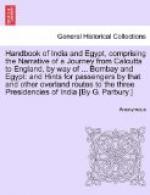Europeans and Natives, shopping!” He was struck,
as I was, by the incongruity of the whole business.
At Jacob’s Circle there was a great display
of military and magisterial strength. Tommy Atkins
had taken up a strong position at the corner of Clerk
Road; sentries paced up and down by day and night;
machine guns gaped upon the fountain erected to the
memory of Le Grand Jacob. At intervals a squadron
of cavalry dashed into the open, halted for a space,
and then as suddenly disappeared; and they were followed
by motor cars and carriages containing Commissioners,
Deputy Commissioners, Police Subordinates, Special
Magistrates and miscellaneous European sightseers.
All the pomp and circumstance of Law and Order were
represented there, and there could scarcely have been
a greater display of armed force, more secret consultations,
more wild dashes hither and thither, more troubled
parleying, if the entire City north of Jacob’s
Circle had been in flames. And yet behind it and
around it the daily life of the people moved forward
in its accustomed channel, The Bhandari’s liquor-shop
at the corner had its full complement of patrons, and
the Bhandari himself might be seen pulling out handfuls
of thirst-producing parched grain for those of his
customers who desired a relish with their liquor;
members of that degraded class which follows one of
the immemorial vices of the East wandered round the
Marwaris’ shops, begging and clapping their
hands in the manner peculiar to them; and across the
diameter of the Circle strayed a group of Barots—those
strange semi-gipsy looking men from Kathiawar who
act as priests and magicians to the Bhangi population.
Seeing the military and police they halted for a moment
and gave one time to have, a word with them:—“Whither
go ye?” we asked, and they replied that they
were bound to the big Bhangi settlement that lies not
far from the Circle.
One of them carried a “bina,” a second
an ordinary school-slate covered with crude cabalistic
signs and a third a rude book, something like a Vani’s
“chopda,” filled with Marathi characters,
which doubtless plays a part in the fortune-telling
and spirit-scaring that form the stock-in-trade of
these wandering hierophants. Hardly had they disappeared
than four Sadhus hove in sight. One of them,
who was smeared with ashes from head to foot, the
lobes of whose ears had been pierced and dragged down
till they nearly touched his shoulders, and who wore
an enormous rosary of Rudraksha berries, acted as
the spokesman of the party and stated that they were
on their way to Nasik. They had come from Benares,
he said, and had spent a week in the shady compound
of the Mahalaksmi temple, where all the Bairagis,
Gosavis and Fakirs of the Indian continent from time
to time congregate. “Do you walk to Nasik
or go by rail” we asked. “By rail”
replied the silver-man. “But surely the
true Sadhu should walk, taking no heed of horse-vehicle
or fire-carriage,” whereat the little fat ascetic
with the gourd smiled pleasantly and made some remark
to the effect that all methods of conveyance are permitted
to the truly devout.




